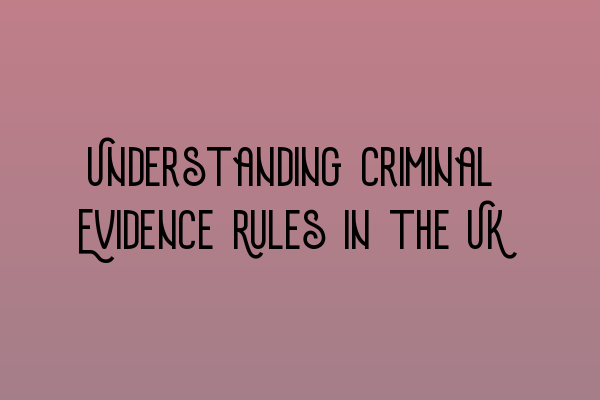Understanding Criminal Evidence Rules in the UK
As a criminal defense solicitor, understanding the rules surrounding criminal evidence in the UK is crucial to providing effective legal representation for your clients. Criminal evidence rules dictate how evidence can be collected, presented, and used in court, and failing to adhere to these rules can have severe consequences. In this article, we will explore the key aspects of criminal evidence rules in the UK and provide insights that will help you navigate this complex area of law.
The Admissibility of Evidence
The admissibility of evidence is a fundamental concept in criminal law. Not all evidence is admissible in court, and it is essential to understand the rules that govern what evidence can be presented. The judiciary applies a strict standard when deciding whether evidence should be admitted or excluded from proceedings.
One key determinant of admissibility is the relevance of the evidence to the case. Evidence must be directly related to proving or disproving a fact in issue. Additionally, evidence that was obtained unlawfully or in breach of someone’s rights may be excluded under the exclusionary rule. These rules help maintain the integrity of the legal process and protect individuals’ rights.
Evaluating the Weight of Evidence
Once evidence is deemed admissible, the weight it carries becomes crucial in determining its significance in the case. Judges and juries evaluate evidence based on various factors, including its reliability, credibility, and consistency. As a solicitor, it is essential to understand how the weight of evidence can influence the outcome of a trial and how to effectively challenge the weight assigned to specific pieces of evidence.
Expert Witnesses and Scientific Evidence
Expert witnesses play a significant role in many criminal cases, especially when scientific evidence or technical knowledge is involved. Expert evidence can help explain complex concepts to the court and assist in establishing the guilt or innocence of a defendant. However, the admissibility of expert evidence is subject to specific criteria, such as the expert’s qualifications and the reliability of their opinions.
If you are handling a case where expert evidence is crucial, it is essential to fully understand the rules governing the admissibility and weight of such evidence. Familiarizing yourself with the guidelines set by the courts and ensuring your expert witnesses meet the necessary criteria will increase the likelihood of successfully presenting your case.
The Role of Cross-Examination
Effective cross-examination is a skill that every criminal defense solicitor must master. Cross-examination allows you to challenge the prosecution’s evidence and raise doubts about its accuracy or reliability. By probing inconsistencies, potential biases, or alternative explanations, you can weaken the prosecution’s case and create reasonable doubt in the minds of the judge or jury.
Through skillful questioning and careful analysis of the evidence, you can expose weaknesses in the prosecution’s case and build a strong defense for your client. However, it is crucial to stay within the limits of acceptable cross-examination techniques and adhere to professional conduct rules.
Stay Informed and Prepared
Staying up to date with the latest developments in criminal evidence rules is essential to effectively represent your clients. The legal landscape is constantly evolving, and being aware of changes and precedents in this area can give you a competitive edge in court.
At SQE Criminal Law & Practice Law UK, we offer comprehensive preparation courses for both SQE 1 and SQE 2 exams. Our courses cover important topics, including criminal evidence rules, and provide the knowledge and skills required to succeed in your legal career. Make sure to check out our SQE 1 Practice Exam Questions and SQE 1 Practice Mocks FLK1 FLK2 to enhance your preparation.
Remember, understanding criminal evidence rules is vital to provide effective legal representation. Stay informed, stay prepared, and continue to refine your skills as a criminal defense solicitor. Good luck!
